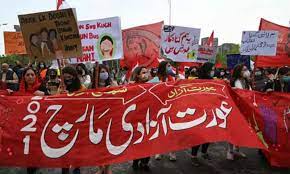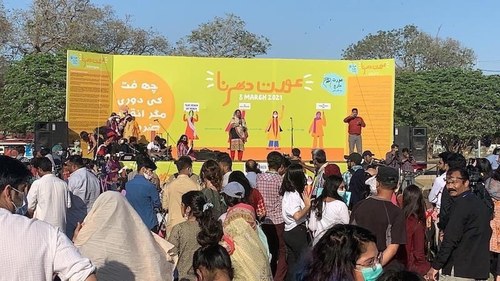Since 2018, Pakistan’s new feminist movement has witnessed a meteoric rise, with the phrase ‘Aurat March’ now becoming virtually synonymous with International Women’s Day. Despite the rising security risks, every March 8, women from various backgrounds walk out of their homes to join the public demonstrations organised in cities across the country.
With the same regularity, Aurat March has triggered an annual national freak-out — exposing deep-seated tensions in a fractured society, as well as a slew of malign opportunists exploiting these fissures to amplify their bigotry. This year, however, the incandescent rage against outspoken women reached a fever pitch in the form of a dangerous disinformation campaign.
Inadvertently by some and deliberately by most, incitement to violence has been mainstreamed through a relentless feedback loop of defamatory and incendiary statements by extreme fringe, right-wing and even ostensibly ‘moderate’ mainstream voices.
Some of the false charges against the women’s movement by the primary beneficiaries of patriarchy are old hat. In March 2019, the ruling Pakistan Tehreek-i-Insaf’s (PTI’s) MNA Aamir Liaquat had called for Aurat March’s source of funds to be investigated, accusing it of attempting to paint a ‘negative image’ of Pakistan. (Since its inception, Aurat March’s chapters have maintained that they accept no funds from any international or local institutions, whether non-profit or corporate.) Since then, multiple public figures and fringe elements have perpetuated this false claim.
In the run-up to this year’s march, Rizvan Saeed, a researcher and development consultant who has been studying online activity against Aurat March, noted at least one coordinated campaign by a social media team — or, put more bluntly, a troll farm. Created in November 2020, this hitherto unknown troll farm recently instigated a hashtag campaign alleging that the march is ‘foreign funded’. It’s the kind of hoax that is easy enough to propagate.
Pakistan’s new feminist movement, as exemplified by the annual Aurat March, has ignited — and exposed — the margins-to-mainstream disinformation pipeline
“In a country where even men are constricted by rigid patriarchal structures,” Saeed says, “the notion of women exercising their autonomy and agency, not to ask but to demand their rights, creates a deep sense of discomfort.” Little wonder then that many would rather dismiss Aurat March by imagining that such women are not speaking for themselves, but at the behest of a ‘foreign hand’.
Last year, Jamiat-i-Ulema-i-Islam-Fazlur Rehman chief Maulana Fazlur Rehman exhorted his supporters to “stop” Aurat March by any means necessary. Students from the Lal-Masjid-affiliated Jamia Hafsa and the proscribed Ahle Sunnat Wal Jamaat both claimed credit for defacing a mural painted in support of Aurat Azadi March in Islamabad; the former later attacked the march.
Multiple suits to ban the demonstrations were filed in courts across the country, by religious groups and habitual petitioners. Members of provincial assemblies gave speeches on the floors of houses condemning the movement; some attempted to pass motions against it. On the airwaves, attention-seekers such as drama-writer Khalilur Rehman Qamar were repeatedly invited to unleash vitriol against feminists in ‘defence’ of culture, religion and country.
All these blatant mainstream attempts to silence outspoken women sent two clear signals to opportunists — from ultra-nationalists to ‘men’s rights’ activists to extremist religious groups — on the margins of public discourse: (i) it’s open season on women, and (ii) if you’re seeking attention on platforms already hyper-saturated with outrage, up the ante.
And they did. What followed was false allegation after false allegation of being anti-religion and, in some instances, of having blasphemed. One bigot after another, from various religious sects and political affiliations, came out in condemnation of Aurat March — eventually culminating in a fatwa issued by the banned Tehreek-i-Taliban Pakistan.
With the same regularity, Aurat March has triggered an annual national freak-out — exposing deep-seated tensions in a fractured society, as well as a slew of malign opportunists exploiting these fissures to amplify their bigotry. This year, however, the incandescent rage against outspoken women reached a fever pitch in the form of a dangerous disinformation campaign.
In Islamabad, the left-wing Women Democratic Front was forced to explain in detail the difference between their flag and the French Tricolour, after it was alleged — and amplified by rightwing ideologue Orya Maqbool Jan on national TV — that it was the latter which had been raised at Aurat March as part of an agenda to promote anti-religious sentiments.
In Lahore, organisers had to issue a clarification after an anonymous account of sexual abuse at the hands of a religious teacher, written on a blanket at the demonstration, was deliberately twisted to smear the March participants. Saeed notes that when this image first circulated online, malign actors invited their followers to ‘interpret’ how its words could be misconstrued against Islam.
In Karachi, a video of slogans chanted at the march was distorted with fake captions and poor sound quality to make similar false claims. This incendiary allegation was then funnelled back into the mainstream via conservative and hyper-nationalist social media influencers, as well as a section of the media that amplified the doctored video on their massive platforms, without any attempt at verification. Some quietly deleted the video once the truth was revealed; others offered feeble apologies.
From 2017, when student Mashal Khan was lynched and killed in his Mardan university and several bloggers were subjected to enforced disappearances (the claims against them in both cases eventually proven to be untrue), Pakistan has now reached the point where false allegations of blasphemy — which in this country are akin to signing death warrants — are being crowd-sourced, even manufactured, as the moral inquisition gathers pace.
Journalist and digital rights activist Farieha Aziz, along with several other female journalists, initiated a petition demanding that those journalists who peddled false claims against Aurat March immediately retract their statements and publicly apologise. The petition also calls for several other corrective measures that the media ought to take to counter false narratives and de-escalate the situation.
When asked why she believes some journalists are susceptible to such blatant disinformation, which endangers lives, Aziz says this is clearly a case of confirmation bias: “These individuals were already primed and ready to believe the worst of those who they are in opposition to, and with no incentive to reverse the damage.
“Whether it’s the Pakistan Electronic Media Regulatory Authority [Pemra], the Pakistan Telecommunications Authority [PTA], the Federal Intelligence Agency [FIA], or even the Prevention of Electronic Crimes Act, 2016 [Peca], these tools of the state are, by design, not intended to protect citizens, especially women and other vulnerable groups,” she says.
“How can they provide accountability when they are not meant to work, unless it is to construct cases against dissenting voices and suppress free expression — even speech that is not prohibited — while those who incite violence are able to do so with impunity? Victims have no legal recourse, no social protection, except to lay low and stay silent — which is not a coincidental by-product of such attacks,” Aziz adds.
From the top down, several members of the government have not shied from making their antipathy towards Aurat March known — albeit cloaked in more coded language, such as ‘Western’ and ‘against family/cultural values’. For the past two years, PTI spokesperson Firdous Ashiq Awan has qualified her support for women’s rights by pandering to the belief that Aurat March must moderate its tone — ironic coming from such a vocally strident party.
But insinuating that Aurat March’s messaging is as problematic as hate speech and incitement to violence is akin to playing both sides. For a party that has continually flown the flag of ‘fake news’ against reports it considers unflattering, the PTI government has been noticeably silent in this regard. Besides Minister Fawad Chaudhry tweeting (bravely, given the current milieu) that those behind the doctored video must be investigated, the Minister for Religious Affairs has said that the (already debunked) allegations of blasphemy would be investigated alongside attempts to doctor images — another bothsidesism.
Social media platforms have been weaponised to peddle controversy and outrage. Public discourse is becoming increasingly polarised by the toxic invective used against political opponents. The mechanisms of the state are often used to silence dissent and victims of abuse of power. The boundaries between the margins and mainstream have blurred, with disinformation being laundered and amplified among the wider public, as traditional means of filtering out false information and conspiracy theories break down.
And, once again, women are the primary targets. The post #MeToo ‘witch-hunt’ that both naysayers and fence-sitters feared, turned out to be real — just not in the way they had portrayed it.
Newspaper: Dawn






